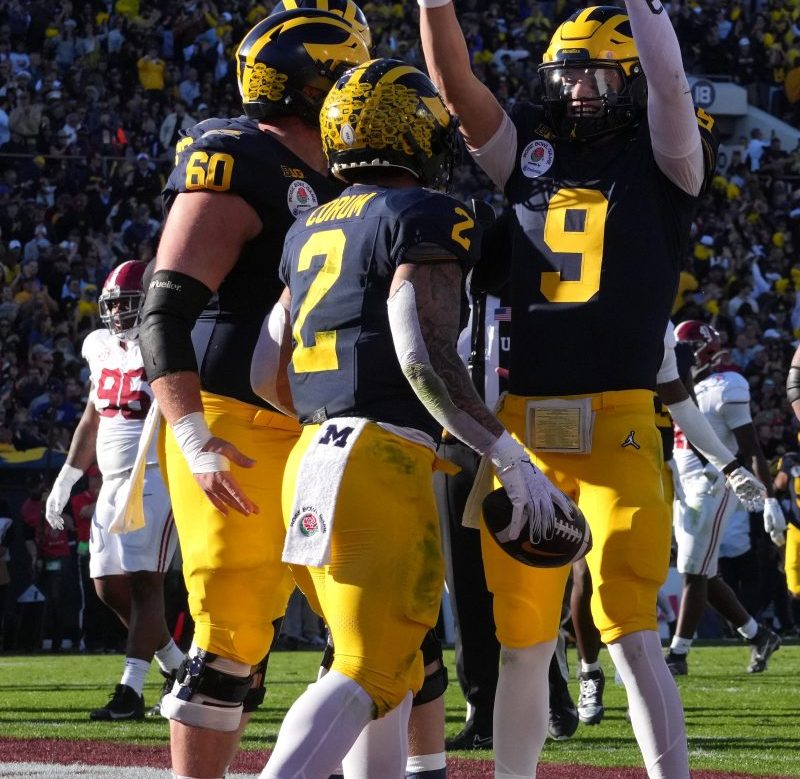
Enjoy this title game. It’s the end of college football as we know it.
In a sport that has grown accustomed to recycling its national champion from the same small pool of programs, the final game of this college football season will offer something that hasn’t been seen for more than three decades and will sadly never be seen again.
Big Ten vs. Pac-12.
Midwest vs. West Coast.
And perhaps most surprising of all given the modern history of the sport, Michigan vs. Washington.
Since the start of the BCS era in 1998 and extending all the way until the last year of the four-team College Football Playoff, Ohio State was the only Big Ten program to win a national title while Southern Cal was the only program from the Pacific time zone to actually finish the job.
That’s going to change Monday thanks to this matchup. And then, for better or worse, conference-based chest beating is going to be just one more relic of the sport’s past.
There will be a lot of conversation over the next few days about how Washington and Michigan will be a conference game next season in the Big Ten — a shining moment for new commissioner Tony Petitti and a reminder of the historic embarrassment shouldered by George Kliavkoff as his Pac-12 crumbled this fall.
The fact is, conference pride — including those cringeworthy “S-E-C!’ chants — is a huge part of what has made college football interesting for decades. But it wasn’t just about which logo your team happens to wear, it was a symbol of shared traditions and idiosyncrasies that everyone within a conference understood. It was like being part of a dysfunctional family that could fight with each other all year but still come to the table and enjoy a nice Thanksgiving.
But these leagues we’re about to get next season?
They aren’t a conference in any sense that we’re familiar with. When Texas and Oklahoma arrive to bring the SEC to 16 members, some of the great backyard brawls that made the league what it is will be turned into expendable games that rotate on and off the schedule. And when the Big Ten adds Washington along with Oregon, USC and UCLA to become an 18-team monstrosity, the only thing that will unite them culturally will be the relentless pursuit of dollars.
Let’s not forget the ACC, which really undercut the whole Atlantic Coast thing by adding two teams from California (Cal and Stanford) and one from Texas (SMU). Or the Big 12, which was the most regionally cohesive of all the leagues until everything blew up and it needed to grab schools in Cincinnati, Orlando and the greater Phoenix area to ensure its survival.
These are no longer cohesive leagues that were built on academic and cultural commonality, they’re chain restaurants trying to plant their flag in every suburban shopping center with foot traffic and good parking. You might as well root for Chipotle and Starbucks.
The point here is, if Washington wins the national championship, that should mean something for the institution of West Coast football. Even for Washington’s rivals, it should be a mark of pride that a team could actually do it in the Pac-12 despite all the obstacles those teams have faced. It should be an inspiration to all the high school coaches from Seattle to San Diego who have seen so many of their top players end up at schools like Alabama and Georgia because of the perception that football is taken more seriously down there than in their own backyard.
But what does any of that really mean when college football is no longer a sport where regionality matters? What’s the fun of comparing one conference to another when we now know the real argument is about which one makes the most money from its television contracts?
Sure, they’ll continue to keep score, but the most important game — the SEC vs. Big Ten — is going to continue until they finish consuming whatever parts they want from the rest of college sports. A few years ago, fans from both leagues could get into any SEC-Big Ten matchup because it was a clash of styles and ideologies.
Now it’s a fight for TV windows and the scraps of other leagues that might collapse in the near future (looking at you, ACC). That’s not nearly as charming.
But on Monday, before college football goes completely corporate, we’re going to get a national champion that truly represents a conference and a region of the country. Sadly, it’s the last time that will mean anything.
